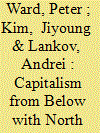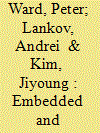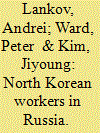|
|
|
Sort Order |
|
|
|
Items / Page
|
|
|
|
|
|
|
| Srl | Item |
| 1 |
ID:
168193


|
|
|
|
|
| Summary/Abstract |
Post-socialist transformation has been studied extensively in Eastern Europe, the former Soviet Union, and other states in Asia. This article will examine the North Korean experience and suggests how North Korea's post-socialist experience can be positioned within the broader picture of post-socialism. In this article we focus on the following three areas: the state sector, capitalist class formation and capital accumulation, and the role of foreign investment. We rely on a reading of North Korean laws and North Korean official publications, previous survey work involving firms dealing with North Korea in the past and present, as well as official North Korean census data to offer as full a picture as is possible.
|
|
|
|
|
|
|
|
|
|
|
|
|
|
|
|
| 2 |
ID:
179558


|
|
|
|
|
| Summary/Abstract |
North Korea today is a most unusual post-socialist state. Market actors and market prices are integral to economic life, but private property remains illegal, and private enterprise outside the household is de jure non-existent. In such an institutional context, some market processes are more autonomous in relation to the state, while others are more embedded within state structures. In this article, we offer a theoretical account of the shape that North Korea's market economy has taken, developed from a set of fishing industry case studies. We note four broad categories of enterprises: closely embedded, loosely embedded, semi-autonomous, and autonomous. By relative autonomy/embeddedness we mean control over fixed assets, cash flow, and operational decisions such as wage and price setting. We postulate three major determinants of embeddedness/autonomy: (1) relative strategic resource scarcity between state and market actors, (2) monitoring costs, and (3) institutional evolution that reflects these realities, though to varying extents.
|
|
|
|
|
|
|
|
|
|
|
|
|
|
|
|
| 3 |
ID:
159180


|
|
|
|
|
| Summary/Abstract |
In the 1990s, a part of the North Korean economy underwent a process of marketization and de facto privatization. While largely spontaneous, this process was eerily reminiscent of developments in other post-Communist countries in Eastern Europe. One of the results was the emergence of a new entrepreneurial class, a nascent bourgeoisie. In order to overcome the obstacles that arose from the lack of any legal framework for their activities, they often chose to register their enterprises with state agencies, creating what we call Pseudo-state Enterprises (PSEs). Utilizing an agency theory approach, with particular emphasis on property rights and contracting problems, this article traces the origin of the PSE, their interaction with the state, how they are managed and the challenges they face. The article is based on refugee interviews with five North Koreans involved with the PSE-related activities in nine entities covering a range of different sectors.
|
|
|
|
|
|
|
|
|
|
|
|
|
|
|
|
| 4 |
ID:
171001


|
|
|
|
|
| Summary/Abstract |
In recent years, North Korean workers overseas have begun to attract increasing attention of the international media, human rights activists, and academics. They are often depicted as being "modern-day slaves," but the present article challenges this approach. It relies on a number of sources, including interviews with former workers (currently residing outside North Korea) and their Russian employers. In many regards, overseas North Korean workers face problematic circumstances. Nonetheless, workers compete for the opportunity to go overseas, since the overseas work, in spite of all hardships, is much preferable to all jobs they can realistically have at home. Rather than seeing themselves as victims, more or less all our interviewees perceive themselves as active and entrepreneurial individuals who succeeded in securing work that, in spite of hard conditions, opens avenues for upward social mobility. They faced constraints and difficulties, of which they are all too aware, but also had agency to act within these constraints. We offer a critical examination of the "forced labor" claim and the applicability of the International Labour Organization's Forced Labour Convention to the issue.
|
|
|
|
|
|
|
|
|
|
|
|
|
|
|
|
| 5 |
ID:
192228


|
|
|
|
|
| Summary/Abstract |
In this article, we trace the strategy of political control employed in North Korea under Kim Jong Un. Using conceptual tools created in the literature on comparative authoritarianism, we consider the roles of repression, co-optation, coercive distribution, and containment with respect to how the North Korean regime responds to external and internal threats. We focus on two areas as case studies in differentiated, contingent political control strategies. First, we consider the role of border as a conduit for unauthorized goods, migrants, and illicit information and the regime’s regulation of it. Second, we examine the regime’s management of internal economic actors, namely urban entrepreneurs and farmers. The main argument of this article is that Kim Jong Un has employed a policy of simultaneous co-optation, repression, and latterly under COVID-19, reemergent coercive distribution, building on but also modifying the strategic approaches pursued under Kim Jong Il.
|
|
|
|
|
|
|
|
|
|
|
|
|
|
|
|
|
|
|
|
|